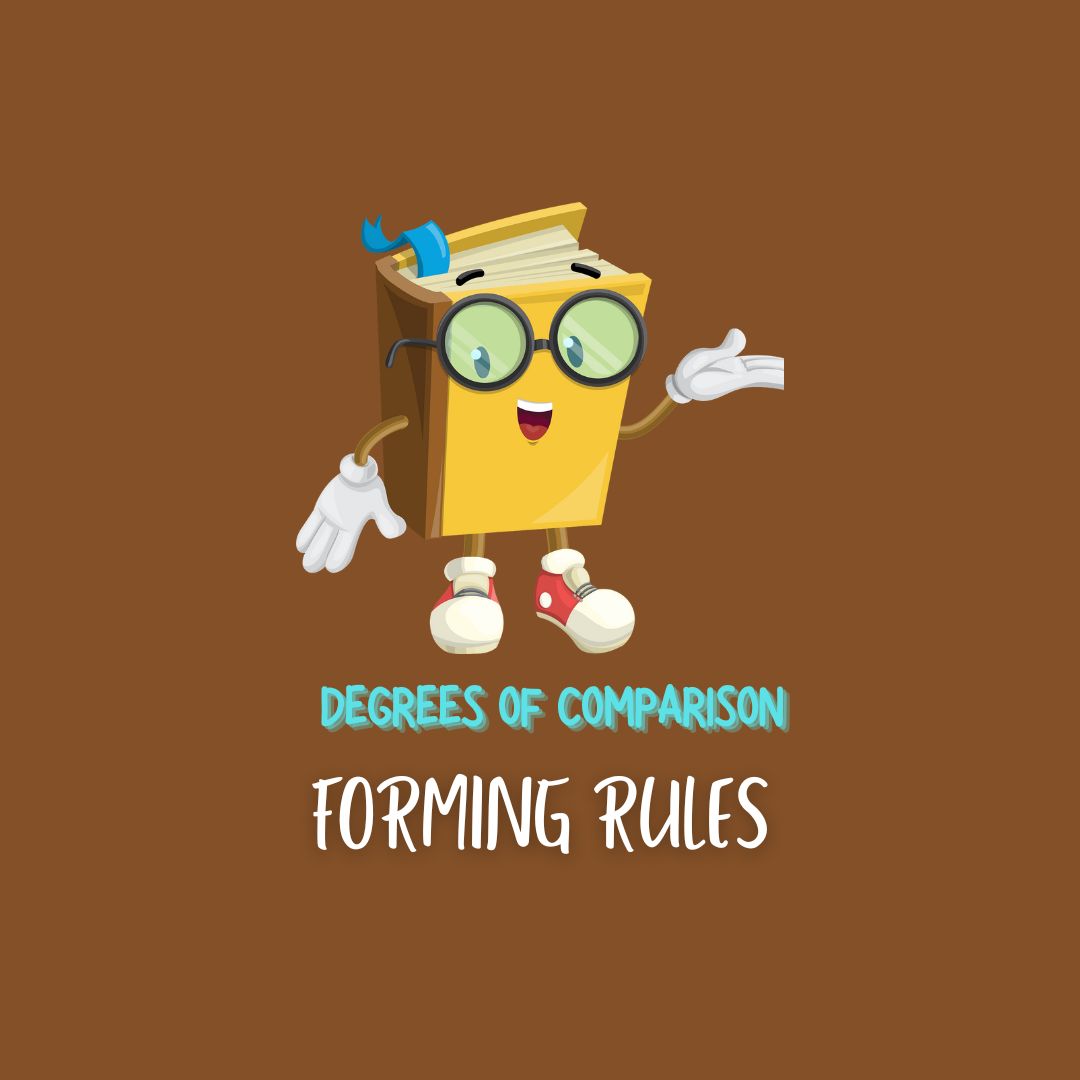How to form the Degrees of Comparison

The Rules of Orthography
Here are the general rules of orthography for forming the comparative and superlative degrees of adjectives
with er and est endings:
For one-syllable Adjectives:
For most one-syllable adjectives, add -er for the comparative and –est for the superlative:
For example: hot, hotter, hottest.
For one-syllable adjectives ending in a single consonant with a vowel before it, double the final consonant before adding –er or –es:.
For example: big, bigger, biggest.
For one-syllable adjectives ending in y, change the y to i, before adding –er or –est:
For example: happy, happier, happiest.
For two-syllable adjectives:
For two-syllable adjectives ending in -y, change the y to i , and add –er or –est:
For example: pretty, prettier, prettiest.
For two-syllable adjectives ending in -er, -le, or -ow, add –er or- -est without any changes:
For example: narrow, narrower, narrowest.
For two-syllable adjectives that do not fall under the above rules, use more for the comparative and most for the superlative:
For example: polite, more polite, most polite.
For Adjectives with a silent e at the end:
When forming the comparative and superlative degrees of adjectives with a silent e at the end, the general rule is to simply add –r for the comparative and –st for the superlative:
For example: large, larger, largest
wide, wider, widest
nice, nicer, nicest
Exceptions to General Rules:
However, there are a few exceptions to this rule:
Adjectives that end in ce or ge drop the e before adding – or -st:
For example: nice, nicer, nicest
large, larger, largest
Adjectives that end in ue keep the e before adding -r or -st:
For example: true, truer, truest
More and the+Most for forming degrees of comparison :
Here are the general rules for forming the comparative and superlative degrees of adjectives using the words more and the+most:
Use more before the adjectives for the comparative degree:
For example: more beautiful, more intelligent.
More before two-syllable Adjectives:
Use more before adjectives that have two or more syllables, and do not follow the one-syllable or two-syllable rules
for forming the comparative and superlative degrees:
For example: delicious, more delicious.
the+Most for Superlative Degree :
Use the+most before the adjectives for the superlative degree:
For example: the most beautiful, the most intelligent.
the+Most before two or more syllable Adjectives:
Use the+most before adjectives that have two or more syllables, and do not follow the one-syllable or two-syllable rules for forming the comparative and superlative degrees:
For example: the most delicious.
Degrees of Comparison of Adjectives with Irregular form:
Adjectives that have irregular comparative and superlative forms cannot be formed using more and most:
Examples of such adjectives include:
good, better, best
bad, worse, worst.
Here’s a table for forming the degrees of comparison with irregular adjectives:
| Irregular Adjective | Positive Degree | Comparative Degree | Superlative Degree |
| Good | Good | Better | Best |
| Bad | Bad | Worse | Worst |
| Little | Little | Less | Least |
| Much/Many | Much/Many | More | Most |
| Far | Far | Farther/Further | Farthest/Furthest |
| Old | Old | Older | Oldest |
| Late | Late | Later | Latest/Last |
| Near | Near | Nearer | Nearest/Next |
| High | High | Higher | Highest/Tallest |
| Low | Low | Lower | Lowest/Shortest |
Here are some examples of irregular adjectives in degree of comparison:
Good: John is a good basketball player, but Tom is even better. Michael Jordan is the best basketball player of all time.
Bad: The weather was bad yesterday, but it’s even worse today. This is the worst storm we’ve had in years.
Little: She had little time to study, but she managed to get a passing grade. He had less time than her, and he failed the exam. I have the least amount of free time among my friends.
Much/Many: There aren’t many people in the park today. There were more people here yesterday. This is the most crowded I’ve ever seen this park.
Far: The store is far from my house, but it’s even farther from yours. This is the farthest I’ve ever had to walk to get to a store.
Old: My grandfather is old, but his brother is even older. Methuselah is said to be the oldest person who ever lived.
Late: I arrived late to the meeting, but luckily it hadn’t started yet. John arrived later than me, and he missed the whole thing. This is the latest I’ve ever been to a meeting.
Near: The store is near my house, but it’s even nearer to yours. This is the nearest store to my house.
High: The Empire State Building is high, but the Burj Khalifa is higher. The Burj Khalifa is the tallest building in the world.
Low: The temperature is low, but it’s even lower than yesterday. This is the lowest temperature we’ve had all year.
How to form the Degrees of Comparison
Degrees of Comparison of the Adjectives
Noun-Modifying (Adjective) Clauses